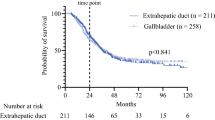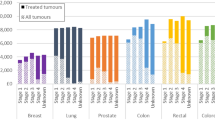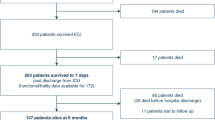Abstract
Background
Hospice provides integrative palliative care for advance-staged hepatocellular carcinoma (HCC) patients, but hospice utilization in HCC patients in the USA is not clearly understood.
Aims
We examined hospice use and subsequent clinical course in advance-staged HCC patients.
Methods
We conducted a retrospective study on a national, Veterans Affairs cohort with stage C or D HCC. We evaluated demographics, clinical factors, treatment, and clinical course in relation to hospice use.
Results
We identified 814 patients with advanced HCC, of whom 597 (73.3%) used hospice. Oncologist management consistently predicted hospice use, irrespective of HCC treatment [no treatment: OR 2.25 (1.18–4.3), treatment: OR 1.80 (1.10–2.95)]. Among patients who received HCC treatment, hospice users were less likely to have insurance beyond VA benefits (47.2 vs. 60.0%, p = 0.01). Among patients without HCC treatment, hospice users were older (62.2 [17.2] vs. 60.2 [14.0] years, p = 0.05), white (62.1 vs. 52.9%, p = 0.01), resided in the Southern USA (39.5 vs. 31.8%, p = 0.05), and had a performance score ≥ 3 (41.9 vs. 31.8%, p = 0.01). The median time from hospice entry to death or end of study was 1.05 [2.96] months for stage C and 0.53 [1.18] months for stage D patients.
Conclusions
26.7% advance-staged HCC patients never entered hospice, representing potential missed opportunities for improving end-of-life care. Age, race, location, performance, insurance, and managing specialty can predict hospice use. Differences in managing specialty and short-term hospice use suggest that interventions to optimize early palliative care are necessary.


Similar content being viewed by others
References
Llovet JM, Zucman-Rossi J, Pikarsky E, et al. Hepatocellular carcinoma. Nat Rev Dis Primers. 2016;2:16018. https://doi.org/10.1038/nrdp.2016.18.
Abubakar II, Tillmann T, Banerjee A. Global, regional, and national age-sex specific all-cause and cause-specific mortality for 240 causes of death, 1990–2013: a systematic analysis for the Global Burden of Disease Study 2013. Lancet (London, England). 2015;385:117–171. https://doi.org/10.1016/s0140-6736(14)61682-2.
El-Serag HB. Hepatocellular carcinoma. N Engl J Med. 2011;365:1118–1127. https://doi.org/10.1056/nejmra1001683.
El-Serag HB, Mason AC. Rising incidence of hepatocellular carcinoma in the United States. N Engl J Med.. 1999;340:745–750. https://doi.org/10.1056/nejm199903113401001.
Temel JS, Greer JA, Muzikansky A, et al. Early palliative care for patients with metastatic non-small-cell lung cancer. N Engl J Med. 2010;363:733–742. https://doi.org/10.1056/nejmoa1000678.
Zimmermann C, Swami N, Krzyzanowska M, et al. Early palliative care for patients with advanced cancer: a cluster-randomised controlled trial. Lancet (London, England). 2014;383:1721–1730. https://doi.org/10.1016/s0140-6736(13)62416-2.
Patel AA, Walling AM, May FP, Saab S, Wenger N. Palliative care and health care utilization for patients with end-stage liver disease at the end of life. Clin Gastroenterol Hepatol. 2017;. https://doi.org/10.1016/j.cgh.2017.01.030.
Poonja Z, Brisebois A, van Zanten SV, Tandon P, Meeberg G, Karvellas CJ. Patients with cirrhosis and denied liver transplants rarely receive adequate palliative care or appropriate management. Clin Gastroenterol Hepatol. 2014;12:692–698. https://doi.org/10.1016/j.cgh.2013.08.027.
Kelly SG, Campbell TC, Hillman L, Said A, Lucey MR, Agarwal PD. The utilization of palliative care services in patients with cirrhosis who have been denied liver transplantation: a single center retrospective review. Ann Hepatol. 2017;16:395–401. https://doi.org/10.5604/16652681.1235482.
Davila JA, Weston A, Smalley W, El-Serag HB. Utilization of screening for hepatocellular carcinoma in the United States. J Clin Gastroenterol. 2007;41:777–782. https://doi.org/10.1097/mcg.0b013e3180381560.
Forner A, Llovet JM, Bruix J. Hepatocellular carcinoma. Lancet (London, England). 2012;379:1245–1255. https://doi.org/10.1016/s0140-6736(11)61347-0.
Kathpalia P, Smith A, Lai JC. Underutilization of palliative care services in the liver transplant population. World J Transplant. 2016;6:594–598. https://doi.org/10.5500/wjt.v6.i3.594.
Johnson KS, Kuchibhatla M, Payne R, Tulsky JA. Race and residence: intercounty variation in black-white differences in hospice use. J Pain Symptom Manag. 2013;46:681–690.
Ngo-Metzger Q, McCarthy EP, Burns RB, Davis RB, Li FP, Phillips RS. Older Asian Americans and Pacific Islanders dying of cancer use hospice less frequently than older white patients. Am J Med. 2003;115:47–53.
Sanders BS, Burkett TL, Dickinson GE, Tournier RE. Hospice referral decisions: the role of physicians. Am J Hospice Palliat Med®. 2004;21:196–202. https://doi.org/10.1177/104990910402100308.
Spencer KL, Mrig EH, Matlock DD, Kessler ER. A qualitative investigation of cross-domain influences on medical decision making and the importance of social context for understanding barriers to hospice use. J Appl Soc Sci. 2017;11:48–59. https://doi.org/10.1177/1936724417692377.
Wachterman MW, Lipsitz SR, Simon SR, Lorenz KA, Keating NL. Patterns of hospice care among military veterans and non-veterans. J Pain Symptom Manag. 2014;48:36–44.
Acknowledgments
This project was supported in part by the National Cancer Institute (R01 CA160738; PI, J. Davila), and the facilities and resources Department of Veterans Affairs, Veterans Health Administration, Office of Research and Development, and the Center for Innovations in Quality, Effectiveness and Safety (CIN 13-413). The views expressed in this article are those of the authors and do not necessarily reflect the position or policy of the Department of Veterans Affairs.
Author information
Authors and Affiliations
Contributions
WYZ designed the study, acquired, analyzed, and interpreted the data and drafted the manuscript. HBE and JAD conceptualized and designed the study and critically revised the manuscript. YHS, SLT, and SS acquired, analyzed, and interpreted the data. FK analyzed and interpreted the data and provided critical revision for the manuscript.
Corresponding author
Ethics declarations
Conflict of interest
The authors declare no conflicts of interest.
Electronic supplementary material
Below is the link to the electronic supplementary material.
Supplemental Figure 1
Kaplan–Meier survival analysis of late-stage HCC patients (BCLC stages C and D) grouped by hospice use and treatment status (PPTX 55 kb)
Rights and permissions
About this article
Cite this article
Zou, W.Y., El-Serag, H.B., Sada, Y.H. et al. Determinants and Outcomes of Hospice Utilization Among Patients with Advance-Staged Hepatocellular Carcinoma in a Veteran Affairs Population. Dig Dis Sci 63, 1173–1181 (2018). https://doi.org/10.1007/s10620-018-4989-4
Received:
Accepted:
Published:
Issue Date:
DOI: https://doi.org/10.1007/s10620-018-4989-4




